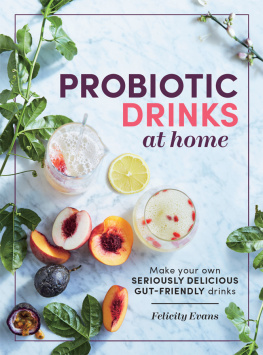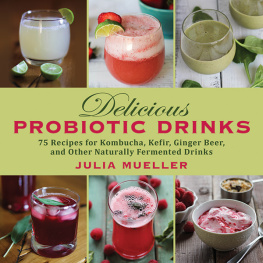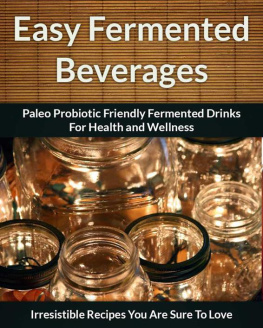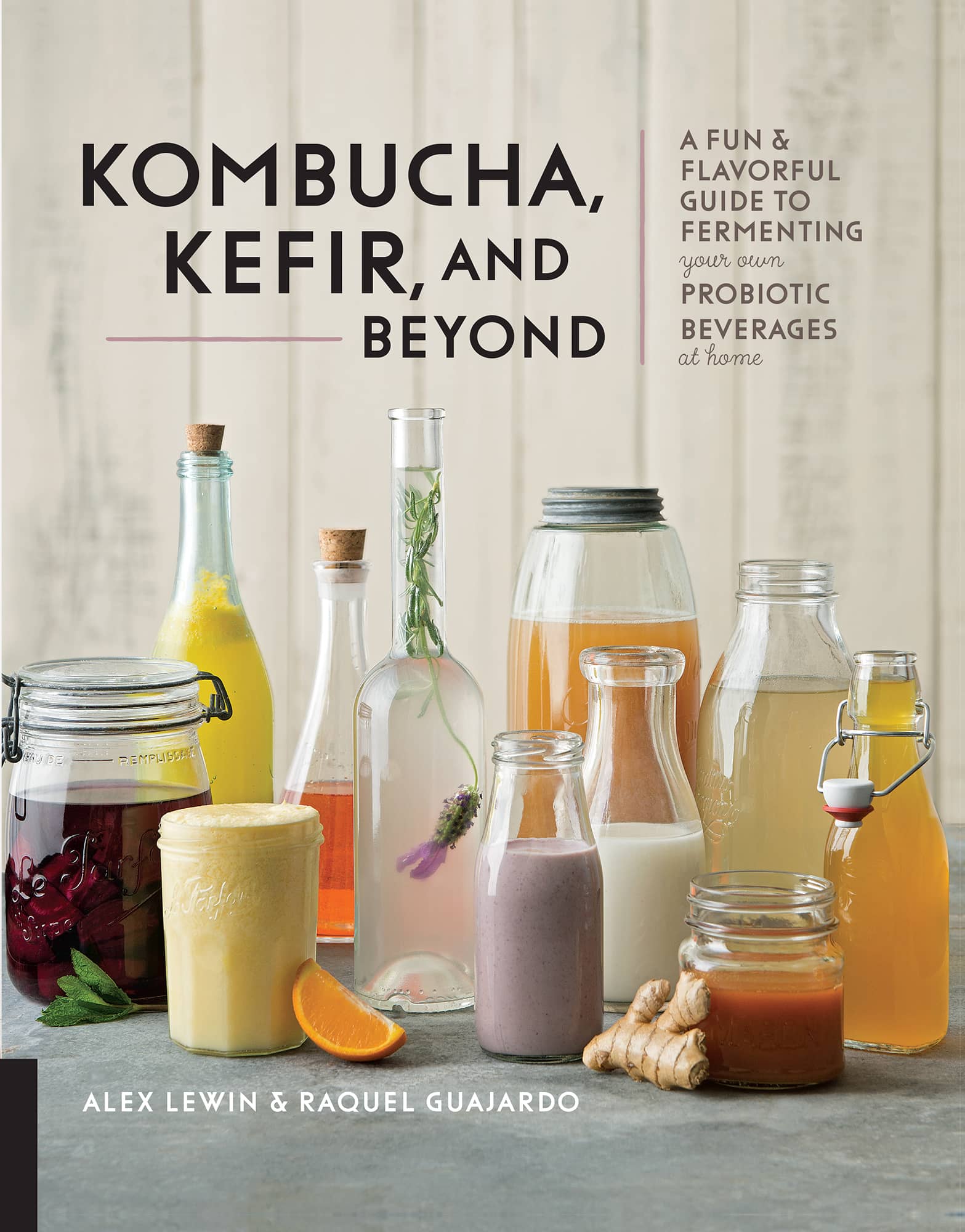KOMBUCHA, KEFIR, AND BEYOND
A FUN & FLAVORFUL GUIDE TO FERMENTING
your own
PROBIOTIC BEVERAGES
at home
ALEX LEWIN & RAQUEL GUAJARDO

PREFACES
RAQUEL GUAJARDO
I WAS BORN and raised in Monterrey, Nuevo Len, an industrial town surrounded by mountains in the north of Mexico that is well known for its carne asada, cabrito, tortilla de harina, and beer. As a proud regiomontana, I have always loved beer, but I didnt associate it with fermentation, and never in my wildest dreams could I have imagined myself brewing my own.
For me, fermentation started in Seattle, Washington, during a Real Food Cooking Course taught by Monica Corrado. Among other things, she taught me how to make sauerkraut and the principles of fermentation. She recommended the book Wild Fermentation by Sandor Katz, and soon I was hooked on everything fermented.
Then, two years ago, I invited Sandor to teach a workshop in Monterrey. More people got hooked, and I got inspired to experiment and come up with my own recipes.
Then I invited Alex to teach another fermentation workshop in Monterrey, on kimchi and the science of fermentation. During his stay, he tasted a couple of my fermented beverages, and I am pretty sure he enjoyed them. After all, the idea for this book was born in my kitchen as we drank pulque and tepache.
ALEX LEWIN
I GREW UP in the Northeast of the U.S., in New York, Connecticut, and Massachusetts. I started thinking and reading about food and health when I was in my 20s. One book would say one thing, another book would say something different and incompatible, and both would have good justifications for what they said. I was curious by nature, and at the time I hated unsolved mysteries, so I started reading more. This led me on a path of discovery informed by Andrew Weil, Sandor Katz, Sally Fallon, the Institute for Integrative Nutrition, the Cambridge School of Culinary Arts, and many more. In fact, my views are informed by almost everyone I talk with about health and food. And I have made my peace with unsolved mysteriesthere will always be some things that we dont know, and Im okay with that. Fermentation, especially with wild starters, depending as it does on invisible forces and serendipity, is a great stage on which to dance with the unknown.
I speak for both Raquel and myself when I say that weve enjoyed being learning partners together. Our skills and perspectives and communities are similar in so many ways, and complementary in so many others; working together has been fun and enlightening.
We are all stronger when we work together, embracing difference, diversity, the unfamiliar, and the unknown. Do not let misguided demagogues suggest otherwise.
We hope that you enjoy this book that weve brewed up for you. Salud!
CHAPTER ONE
WHY FERMENT YOUR DRINKS?
We are in the midst of a health crisisor, to put it another way, a disease crisis. For proof, just turn on the television. Youll be exhorted to buy diabetes maintenance equipment; cholesterol-lowering drugs with significant side effects; digestive nostrums that blunt unpleasant symptoms without addressing underlying causes; allergy pills that suppress the immune system; painkillers; and more.
The interspersed commercials are for sugary drinks, junk food, and toxic personal care and cleaning products, the use of which likely contributes to conditions such as diabetes, cardiovascular disease, digestive problems, and allergies. Sound familiar? It doesnt seem like this is a complete coincidence.
Love it or hate it, advertising is a reliable bellwether: The commercials we see are the ones that sell product and make money. Super Bowl commercials, for example, are the caviar of the domestic advertising world. Guaranteed millions of viewers, these ads cost 10 million dollars per minute. Yet during the 2016 Super Bowl, we saw an ad for a drug to address a very specific malady that many of us had never considered: opioid-induced constipation. Opioids are opium-derived and opium-related drugs, including a long list of prescription painkillers and street drugs. If we were a nation of healthy people, wed be seeing different commercials.
Mexico finds itself in the same boat as the United States. It is one of the worlds most obese countries with one of the highest infant diabetes rates. American fast food chains and supermarkets have been crowding out mercados, where fresh seasonal food used to be found. For the younger generations, buying American fast food is part of the modern way of life, cool and hip, like having a cell phone, whereas the typical grandma foods such as pozole, tamales, and mole are old-fashioned. Even the tortilla, the hallmark of Mexican food, has changed for the worse, and sadly, traditional tortilleras are disappearing.
As the United States goes, so go not only her American neighbors, but much of the world. With the expansion of markets for big-business food and tobacco products comes diabetes, heart disease, obesity, cancer, and chronic digestive and immune system dysfunction. And these maladies create new markets for pharmaceutical products.
Are drugs really the best way to break this cycle? Maybe fermented beverages can help.
WHAT IS FERMENTATION, ANYWAY?
Fermentation is the transformation of food through the action of microbes. Microbes are microscopic life forms, including bacteria, yeasts, and molds. (Viruses are sometimes considered microbes. They have no metabolism, so they arent direct agents of fermentation, and they wont be discussed here.) Via chemical reactions, these microbes transform carbohydrates (sugars and starches) into acids, alcohols, and gases. Along the way, small but useful amounts of vitamins and enzymes are created too.
Digestion refers to processes in living organisms that break down food into various components. Digestion is generally accelerated by heat and catalyzed by special proteins called enzymes. Enzymes are employed by all life forms, from microbes to mammals. In fact, it turns out that many of the same enzymes used by microbes are also found in the human digestive tract. This is not a coincidencemany of our gut enzymes are created by microbes that live there. These enzymes play a crucial role in human digestion.

These enzymes also play a crucial role in fermentation, which happens when microbes use them to start breaking down food. These microbes are effectively predigesting our fermenting food, in some of the same ways that we ourselves digest food inside our bodies, using some of the same enzymes. So when we eat fermented foods, we are getting ahead of the game; these foods are easier for our bodies to digest. This may help us to better assimilate important nutrients from the foodwe have more time to break down compounds that could inhibit nutrient uptake. It may also reduce difficult-to-digest and inflammatory compounds, so we face fewer signs of digestive difficulties such as gas, bloating, acid reflux, and heartburn. This helps us to mitigate, avoid, and sometimes reverse chronic long-term digestive diseases.












